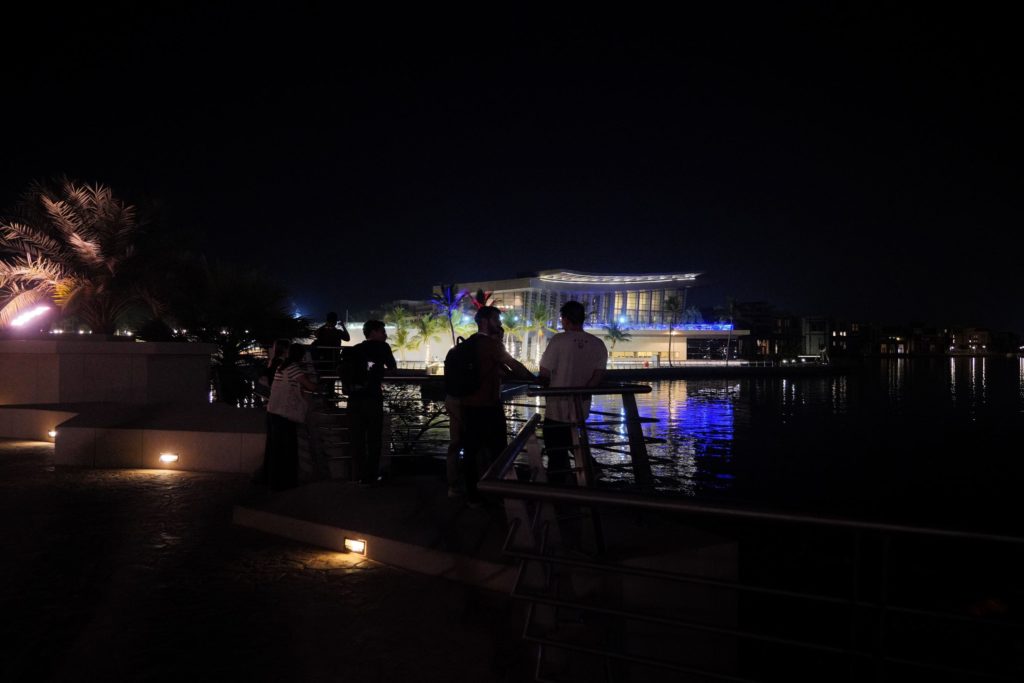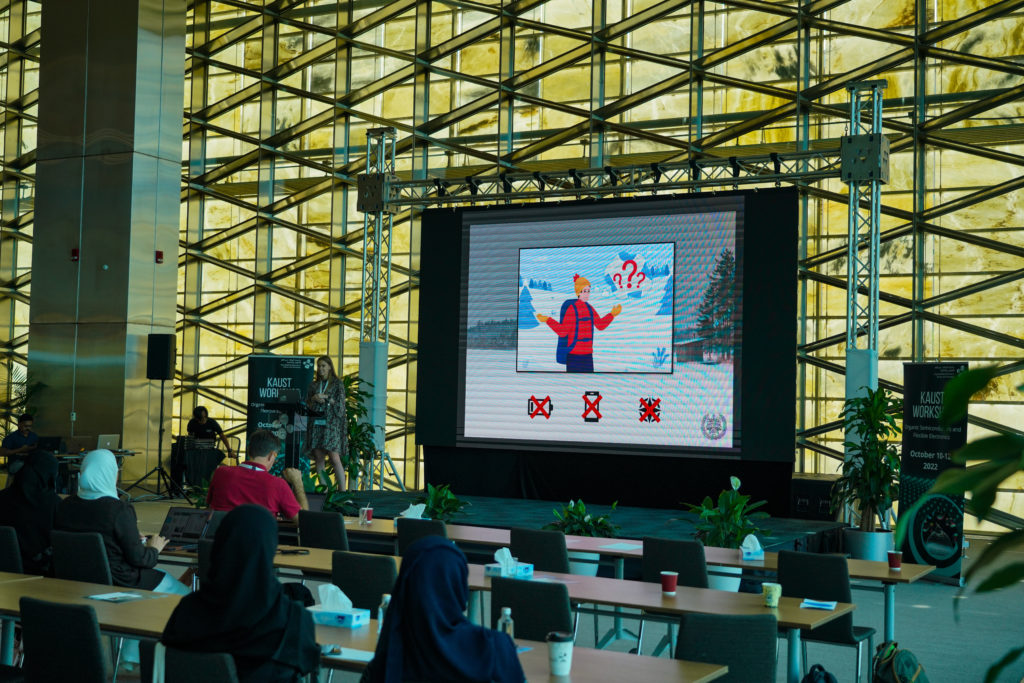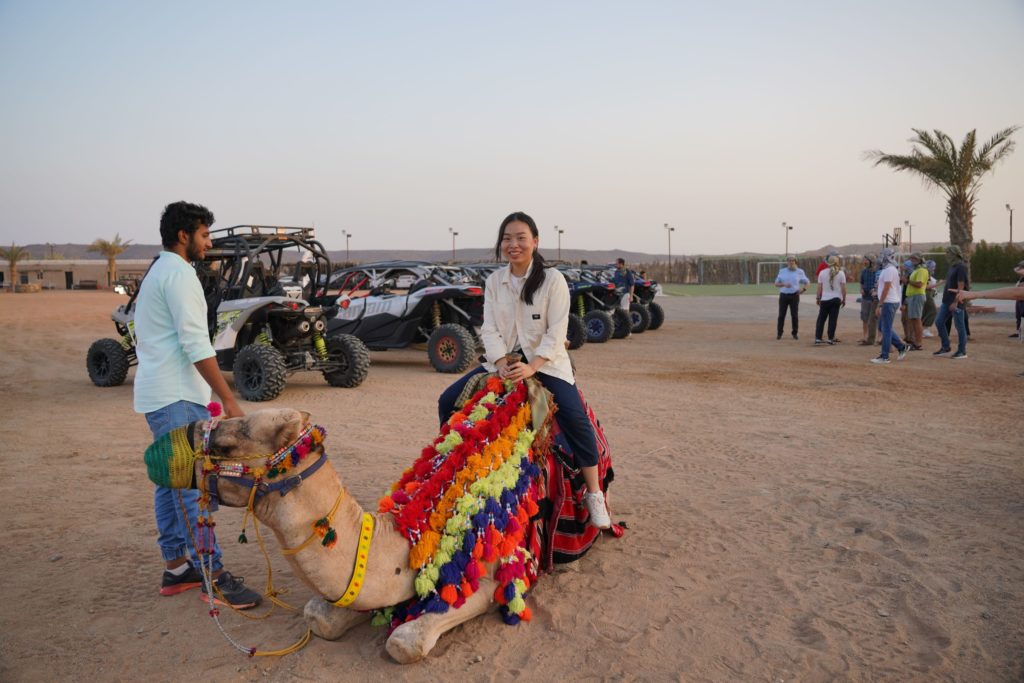The third HORATES project Progress Meeting was hosted by the King Abdullah University of Science and Technology (KAUST) Solar Center in Thuwal, Saudi Arabia from October 9-13, 2022. The Progress Meeting coincided with the “KAUST Workshop on Organic Semiconductors and Flexible Electronics 2022”, an event organized by Prof. Derya Baran and Prof. Sahika Inal that brought a wide range of leading researchers, industry partners and young researchers from around the world to discuss topics such as:
- Design and synthesis
- Processing, doping, and characterization
- Theory and Modeling
- Device prototyping and upscaling
In the following you will find a summary and some impressions of the event. A detailed agenda of the “KAUST Workshop on Organic Semiconductors and Flexible Electronics 2022” can be found here
https://ksc.kaust.edu.sa/kaustworkshop2022/events

Day 0
Sunday, 9 October 2022
Most of the ESRs were able to attend the third Progress Meeting in person, but visa complications limited a few ESRs to virtual attendance. Those who traveled to Saudi Arabia arrived on Sunday in Jeddah and checked into campus accommodation kindly provided by KAUST. On Sunday evening, some of the ESRs and young researchers from Prof. Baran’s group explored the old quarter of Jeddah, Al-Balad. The group tasted some traditional Saudi coffee, karak chai, dates and pastries at the Hejaz Coffee Museum and Café before wandering through the old streets and markets of Al-Balad. At dinner, the ESRs and researchers from Prof. Baran’s group tasted a variety of traditional Turkish food while discussing research and life in Saudi Arabia.


Day 1
Monday, 10 October 2022
On the first day of the workshop, the attendees heard fascinating talks on the “Tuning the Performance of Conjugated Polymers by Post-polymerisation Modification” from Prof. Martin Heeney (KAUST), “Sequence and assembly of conjugated polymer by high-resolution imaging” from Prof. Giovanni Costantini (Univ. of Birmingham), “On the role of the (de)localization length” from HORATES coordinator Prof. Martijn Kemerink (Univ. of Heidelberg) and “An Overview of Second Sound in Solid Materials” from HORATES researcher Dr. Juan Sebastián Reparaz (ICMAB). The technical talks were followed by a presentation on technology transfer strategies and incubator programs given by Dr. Riddhi Shukla (KAUST). Lastly, the young researchers, including all ESRs, had a short training on scientific dissemination skills, specifically on poster presentations, led by Andrew Cornforth (KAUST). The First day of the workshop was rounded off with a gala dinner hosted by the Al Marsa Yacht Club on shore of the Red Sea.

Day 2
Tuesday, 11 October 2022
The second day of the workshop, the ESRs and other young researcher attendees participated in a fascinating discussion with Dr. Vincent Linseis, the Managing Director of Linseis Messgeräte GmbH, centered around the measurement of the thermal and electrical transport measurements on bulk and thin films. Dr. Linseis discussed the development, validation and operation of Linseis Messgeräte’s lineup of instruments suited for the characterization of thermoelectric properties of organic semiconductors and power output of thermoelectric generators. The young researchers were able to ask Dr. Linseis questions before taking a tour of Prof. Baran’s lab in the KAUST Solar Center where they had a hands-on demonstration of the operation of the Linseis Thin Film Analyzer, used to characterize electrical conductivity, Seebeck coefficient and thermal conductivity all on the same sample. During this time the visiting PI’s and Professors had the opportunity to tour KAUST’s Core Labs, a system of multidisciplinary, interconnected laboratories that is meant to be a common resource on the KAUST Campus and accessible by all research groups.
Following lunch in the Campus Diner, the technical talks resumed with presentations on “Soft and flexible bioelectronics for brain-machine interface” from Prof. Jia Liu (Harvard Univ.), “Tuning the molecular design of polymers to achieve self-assembled degradable, semiconducting, and stretchable composites” from Prof. Helen Tran (Univ. of Toronto), “Enabling stretchable electronics through intrinsically-stretchable conjugated polymer materials” from Dr. Vivian Feig (Stanford Univ.), “3D Printable Conducting Polymers for Bioelectronics” from Prof. David Mecerreyes (POLYMAT) and “Towards Sustainable Sensor Technologies through Hybrid Approaches” from Prof. Benjamin Tee (Nat. Univ. of Singapore). In the evening, the ESRs and other young researcher attendees presented their e-posters and discussed their research with the other workshop attendees. A panel of secret judges were evaluating each of the e-posters in order to name the 1st, 2nd and 3rd place winners of the e-poster competition.
Day 3
Wednesday, 12 October 2022
The last day of the workshop began with presentation on KAUST’s Semiconducto Initiative from Prof. Mohamed-Slim Alouini (KAUST), “NanoManufacturing of Sustainable Circular Electronics” from Prof. Thomas Anthopoulos (KAUST), “Organic mixed ionic-electronic conductors for low-power electronics” from HORATES PI Prof. Simone Fabiano (Linköping Univ.) and “Printed sensors for monitoring soil and plant conditions” from Prof. Gregory Whiting (Univ. of Colorado). The final day of the workshop also gave young researchers the opportunity to practice their presentation skills in the form of Pecha-Kucha talks. This presentation format is a storytelling format in which the presenter shows 20 slides with just 20 seconds for each slide. HORATES ESRs Mariavittoria Craighero (Chalmers Univ. of Tech.) and Federico Ferrari (Univ. of Groningen) were two of the five students who presented their research through this unique storytelling format.


After lunch the workshop was rounded off with three final talks on “From UV to Near-Infrared light detection: next generation photodetectors for imaging and biometric applications” from Prof. Nicola Gasparini (Imperial College of London), “Organic neuromorphic electronics” from Dr. Paschalis Gkoupidenis (Max Planck Institute for Polymer Research), and a special talk on “Crafting an pitching the perfect review” from Dr. Giulia Pacchioni, Chief Editor of Nature Reviews Materials. The workshop was concluded with remarks from organizers Prof. Derya Baran and Prof. Sahika Inal followed by the announcement of the winners of the e-poster competition.
- 1st Place: HORATES ESR Nathan Pataki (IIT)
- 2nd Place: Soyeong Jang (KAUST)
- 3rd Place: Victor Druet (KAUST)

Following the concluding remarks, there was a surprise event in the Saudi Arabian desert where attendees had the opportunity to take a thrilling ride on 4-wheeler ATVs in the sand dunes at sunset followed by a traditional dinner served at a Saudi Arabian desert camp.


Day 4
Thursday, 13 October 2022
HORATES PI’s and ESRs travel back to their respective countries.
On behalf of all HORATES members, we would like to extend our gratitude to Prof. Derya Baran, Prof. Sahika Inal, KAUST and the Kingdom of Saudi Arabia for organizing such a stimulating workshop and for their incredible hospitality.